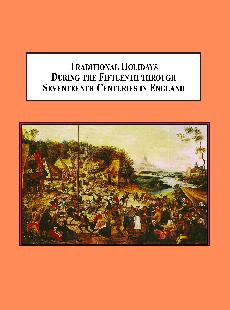Traditional Holidays During the Fifteenth Through Seventeenth Centuries in England
We are currently unable to ship to the EU countries at this time. We apologize for this inconvenience.

| Author: | ||
| Year: | 2012 | |
| Pages: | 268 | |
| ISBN: | 0-7734-4051-8 978-0-7734-4051-7 | |
| Price: | $199.95 + shipping | |
| (Click the PayPal button to buy) | ||
The book argues that the English people in the early modern period magnified their daily activities during holidays and recounting these activities in their folklore. Magnified socio-economic, gendered, and even ageist tensions of the writers as well as among the people of whom they write. These tales are told through several forms; for instance in letters, diaries, witchcraft trial pamphlets, chronicles, and folklore, which are the primary source documents that are examined.
Reviews
“The manuscript fills a hole in current scholarship by interrogating how festive rituals and practices related to class, gender, and national identities. In particular, the argument in this manuscript demonstrates how festive practices like gift-giving, dancing, etc… reinforced or violated normative performances of gender, class, and national identity. It also shows how these practices helped not only one’s self-identity, but also a person’s standing in his or her community.”
Prof. Trish Thomas Henley,
University of Cincinnati
“This book makes our picture of early English life fuller, and has contributed substantially to our understanding of the time period. Twenty-first century life in the English-speaking-world is increasingly estranged from the natural seasons and the ecclesiastical seasons that meant so much to our predecessors. Moreover, the special days that have been singled out for their significance have become merely occasions to enjoy tasty foods, decorations, and amusements. This book will give people a sense of the term ‘holy day’ as the origin of the word holiday.”
Prof. Randi Eldevik
Oklahoma State University
Prof. Trish Thomas Henley,
University of Cincinnati
“This book makes our picture of early English life fuller, and has contributed substantially to our understanding of the time period. Twenty-first century life in the English-speaking-world is increasingly estranged from the natural seasons and the ecclesiastical seasons that meant so much to our predecessors. Moreover, the special days that have been singled out for their significance have become merely occasions to enjoy tasty foods, decorations, and amusements. This book will give people a sense of the term ‘holy day’ as the origin of the word holiday.”
Prof. Randi Eldevik
Oklahoma State University
Table of Contents
Foreword by Randi Eldevik
Preface
Acknowledgments
Introduction
Methodology
The Holidays
The Chapters
Section One: Harvest the Rent and Sing with the Landlord: Identity through Socio-Economic Practices
Chapter 1: Steam the Pudding and Wrap the Present: Holiday Practices of Giving and Receiving
Physical Gift-Giving
The Gift of Loyalty
Gifts of Social Ranking
Feasting
The Religion of Feasting
The Politics of Feasting
Chapter 2: Misbehave Under the Maypole and Stoke the Fire-Holiday Sports and Entertaining Activities
The Lord of Misrule and Carnival
May Day and Maying
Robin Hood Plays
Masques and the Maypole
Midsummer Watches and Apprentice Suppression
Chapter 3: Sow the Debts and Buy the Cloth-Business Transactions as Holiday Practices
Lammas Riots and the Lower Class
Rent
Payment of Goods and Lent
Servanthood
Livery and Holiday Clothing
Illegal Business Practices
Section Two: Bade the Bread and Kiss the Host: Identity Through Feminine Gender Roles and Sexuality
Chapter 4: Dance the Reel and Court the Clerk-Traditional Holidays and the English Maiden
Singing the Queen of the May, and Scrying
The Maiden and Dancing
The Maiden and Gift-Giving
The Maiden and Serving
Holiday Attire and Cross-Dressing
Chapter 5: Order the Spices and Spin the Yarn-Agency of the Housewife During the Traditional Holidays
The Housewife and Business Transactions
Hospitality
The Housewife and Her Servants
The Housewife and her Husband
The Housewife and her Children
Chapter 6: Beg for Bread and Lend the Money-Widows and Elderly Women During the Traditional Holidays
The Widows and Festivities
The Widow and Business Transactions
The Widow as Witch
Conclusion: The Dance Continues
Appendices
Bibliography
Index
Preface
Acknowledgments
Introduction
Methodology
The Holidays
The Chapters
Section One: Harvest the Rent and Sing with the Landlord: Identity through Socio-Economic Practices
Chapter 1: Steam the Pudding and Wrap the Present: Holiday Practices of Giving and Receiving
Physical Gift-Giving
The Gift of Loyalty
Gifts of Social Ranking
Feasting
The Religion of Feasting
The Politics of Feasting
Chapter 2: Misbehave Under the Maypole and Stoke the Fire-Holiday Sports and Entertaining Activities
The Lord of Misrule and Carnival
May Day and Maying
Robin Hood Plays
Masques and the Maypole
Midsummer Watches and Apprentice Suppression
Chapter 3: Sow the Debts and Buy the Cloth-Business Transactions as Holiday Practices
Lammas Riots and the Lower Class
Rent
Payment of Goods and Lent
Servanthood
Livery and Holiday Clothing
Illegal Business Practices
Section Two: Bade the Bread and Kiss the Host: Identity Through Feminine Gender Roles and Sexuality
Chapter 4: Dance the Reel and Court the Clerk-Traditional Holidays and the English Maiden
Singing the Queen of the May, and Scrying
The Maiden and Dancing
The Maiden and Gift-Giving
The Maiden and Serving
Holiday Attire and Cross-Dressing
Chapter 5: Order the Spices and Spin the Yarn-Agency of the Housewife During the Traditional Holidays
The Housewife and Business Transactions
Hospitality
The Housewife and Her Servants
The Housewife and her Husband
The Housewife and her Children
Chapter 6: Beg for Bread and Lend the Money-Widows and Elderly Women During the Traditional Holidays
The Widows and Festivities
The Widow and Business Transactions
The Widow as Witch
Conclusion: The Dance Continues
Appendices
Bibliography
Index
